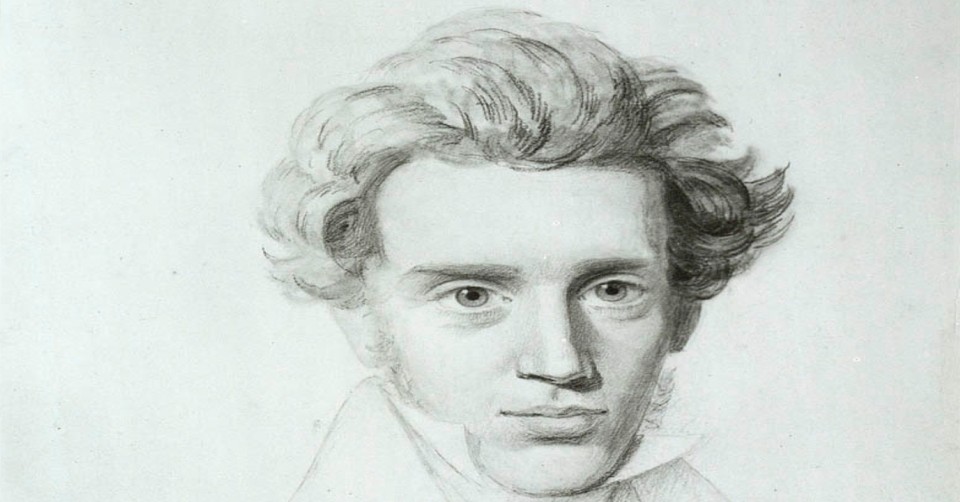20 Søren Kierkegaard Quotes about Christianity

Søren Kierkegaard (1813-1855) was not only one of the most influential philosophers of all time but also a seminal theologian who pushed Christian thought in new directions. Religious scholars still debate the implications of Kierkegaard’s writings about faith—whether some of his ideas lead too much into subjectivism or whether they point back to the Bible’s emphasis on faith being something radical.
Here are some of Kierkegaard’s most interesting thoughts on Christianity from his various works.
5 Søren Kierkegaard Quotes about God
Whether it was in words written directly to God or in descriptions of God’s nature, Kierkegaard provided provocative insights into who God is.
1. “Father in Heaven! Show us a little patience; for we often intend in all sincerity to commune with You and yet we speak in such a foolish fashion.” — The Prayers of Kierkegaard
2. “God’s greatness lies in forgiving, in showing mercy, and in this greatness He is greater than the heart which condemns itself.” — Christian Discourses
3. “Do not despair over every relapse, which the God of patience has the patience to forgive and under which a sinner certainly should have the patience to humble himself. No, fear nothing and do not despair; he who says ‘Come here’ is with you on the way; from him there is help and forgiveness on the way of conversion that leads to him, and with him is rest.” — Practice in Christianity
4. “How could one speak properly about love if you were forgotten, you God of love, source of all love in heaven and on earth; you who spared nothing but in love gave everything; you who are love, so that one who loves is what he is only by being in you.” — Works of Love
5. “Out of love, God becomes man. He says: ‘See, here is what it is to be a human being.’” — The Sickness Unto Death
5 Søren Kierkegaard Quotes about Jesus
Not only did Kierkegaard discuss the nature of God the father, but also the transformative and provocative nature of God the son. Some of Kierkegaard’s most memorable writings are his meditations on what Jesus of Nazareth said and what those words meant for humanity.
1. “Out of love, God becomes man. He says: ‘See, here is what it is to be a human being.’” — The Sickness Unto Death
2. “There is still one who is able to put himself completely in your place, the Lord Jesus Christ, who ‘because he has suffered and himself been tempted is able to help those who are tempted.’”— Three Discourses at Friday Communion
3. “Christ came to the world with the purpose of saving the world, also with the purpose—this in turn is implicit in his first purpose—of being the prototype, of leaving footprints for the person who wanted to join him, who then might become an imitator…” — Practice in Christianity
4. “‘I will give you rest.’ Strange! For then the words “come hither unto me” must be understood to mean: stay with me, I am rest; or, it is rest to remain with me. It is not, then, as in other cases where he who helps and says ‘come hither’ must afterwards say: ‘now depart again,’ explaining to each one where the help he needs is to be found, where the healing herb grows which will cure him, or where the quiet spot is found where he may rest from labor, or where the happier continent exists where one is not heavy laden. But no, he who opens his arms, inviting every one—ah, if all, all they that labor and are heavy laden came to him, he would fold them all to his heart, saying: ‘stay with me now; for to stay with me is rest.’” — Preparation for a Christian Life
5. “Come hither all, all ye—with him is rest; and he will raise no difficulties, he does but one thing: he opens his arms.” — Preparation for a Christian Life
5 Søren Kierkegaard Quotes about Following God
Kierkegaard’s words about the Christian life—the challenges of faith, how we live out faith each day—highlight both its simplicity and complexity.
1. “Through the urging of his faith Abraham left the land of his forefathers and became a stranger in the land of promise. He left one thing behind and took one thing along: he left his worldly wisdom behind and took with him faith. For else he would not have left the land of his fathers, but would have thought it an unreasonable demand.” — Fear and Trembling
2. “Carried to its extreme limit, what is pleasure other than disgust? What is earthly honor at its dizzy pinnacle other than contempt for existence? What are riches, the highest superabundance of riches, other than povertry? For no matter how much all the earth’s gold hidden in covetousness may amount to, is it not infinitely less than the smalle smite hidden in the contentment of the poor?” — Purity of Heart is to Will One Thing
3. “What is asked of a man that he may be able to pray for his enemies? To pray for one’s enemies is the hardest thing of all. That is why it exasperates us so much in our present-day situation.” — Journals and Papers of Søren Kierkegaard
4. “A person can perhaps succeed in hiding his sins from the world, he can perhaps be foolishly happy that he succeeds, or yet, a little more honest, admit that it is a deplorable weakness and cowardliness that he does not have the courage to become open-but a person cannot hide his sins from himself.” — Two Discourses at Friday Communion
5. “When you are reading God’s Word, it is not the obscure passages that bind you but what you understand, and with that you comply at once. If you understood only one single passage in all of Holy Scripture, well, then you must do that first of all, but you do not first have to sit down and ponder the obscure passages.” — For Self-Examination
5 Søren Kierkegaard Quotes about the Church
Kierkegaard’s passion for truth and his conviction that the Danish church of his day had wandered away from Christianity’s transformative power led him to make provocative statements about the church. While these quotes are not easy to read, many of the concerns Kierkegaard raised are still concerns we need to watch out for today.
1. “In our times, as was remarked, no one is content with faith, but ‘goes right on.’ The question as to whether they are proceeding may be a silly question; whereas it is a sign of urbanity and culture to assume that every one has faith, to begin with, for else it were a curious statement for them to make, that they are proceeding further. In the olden days it was different. Then, faith was a task for a whole life-time because it was held that proficiency in faith was not to be won within a few days or weeks.” — Fear and Trembling
2. “… and let us worship God again in simplicity, instead of making a fool of him in splendid edifices; let us be in earnest again and stop playing; for a Christianity preached by royal officials who are payed and insured by the state and who use the police against the others, such a Christianity bears about the same relation to the Christianity of the New Testament as swimming with the help of a cork-belt or a bladder does to swimming alone—it is mere play.” — The Present Moment
3. “The intention of Christianity was: to change everything.” — The Present Moment
4. “In times long, long past people looked at matters in this fashion: it was demanded of him who would be a teacher of Christianity that his life should be a guarantee for the teachings he proclaimed. This idea was abandoned long ago, the world having become wiser and more serious. It has learned to set little store by these illiberal and sickly notions of personal responsibility, having learned to look for purely objective ends. The demand is made now of the teacher that his life should guarantee that what he has to say is entertaining and dramatic stuff, amusing, and purely objective.” — The Present Moment
5. “There is in Christendom an incessant twaddling on Sundays about the glorious and invaluable truths of Christianity, its mild consolation. But it is indeed evident that Christ lived 1800 years ago; for the rock of offense and object of faith has become a most charming fairy-story character, a kind of divine good old man. People have not the remotest idea of what it means to be offended by him, and still less, what it means to worship… Christendom has done away with Christianity, without being aware of it. Therefore, if anything is to be done about it, the attempt must be made to re-introduce Christianity.” — Preparation for a Christian Life
Further Reading:
10 Things You Need to Know about Søren Kierkegaard
What Did They Ask Kierkegaard?
What Is the Origin of the Phrase ‘A Leap of Faith’?
Photo Credit: N.C. Kierkegaard/Wikimedia Commons

Originally published July 19, 2022.




